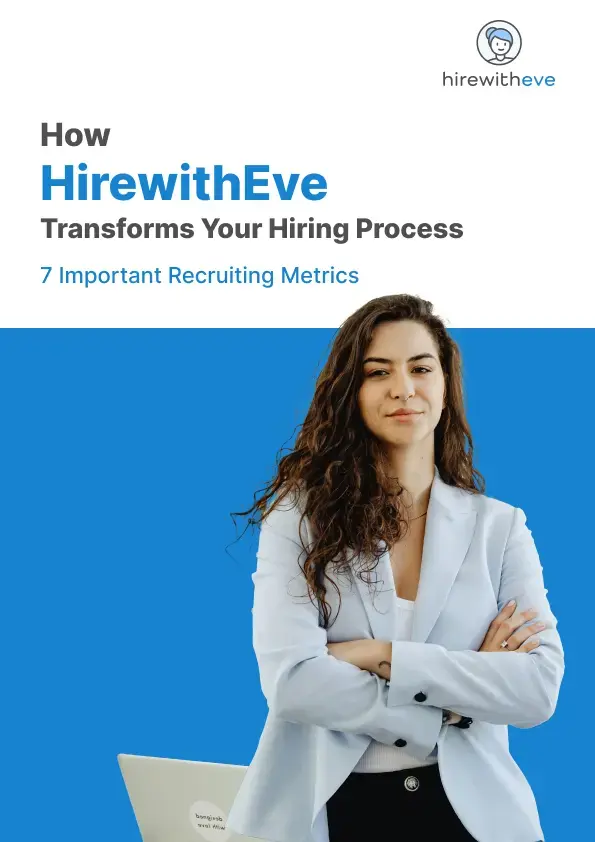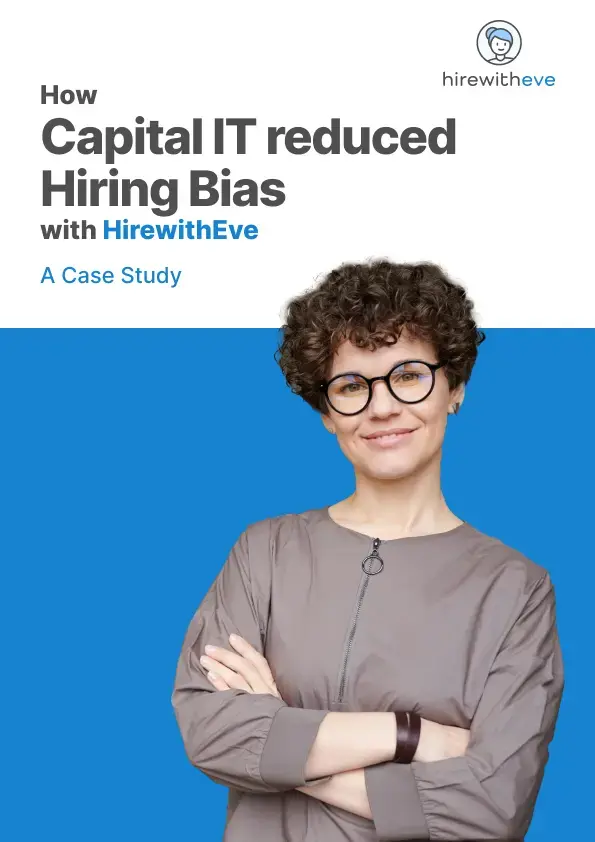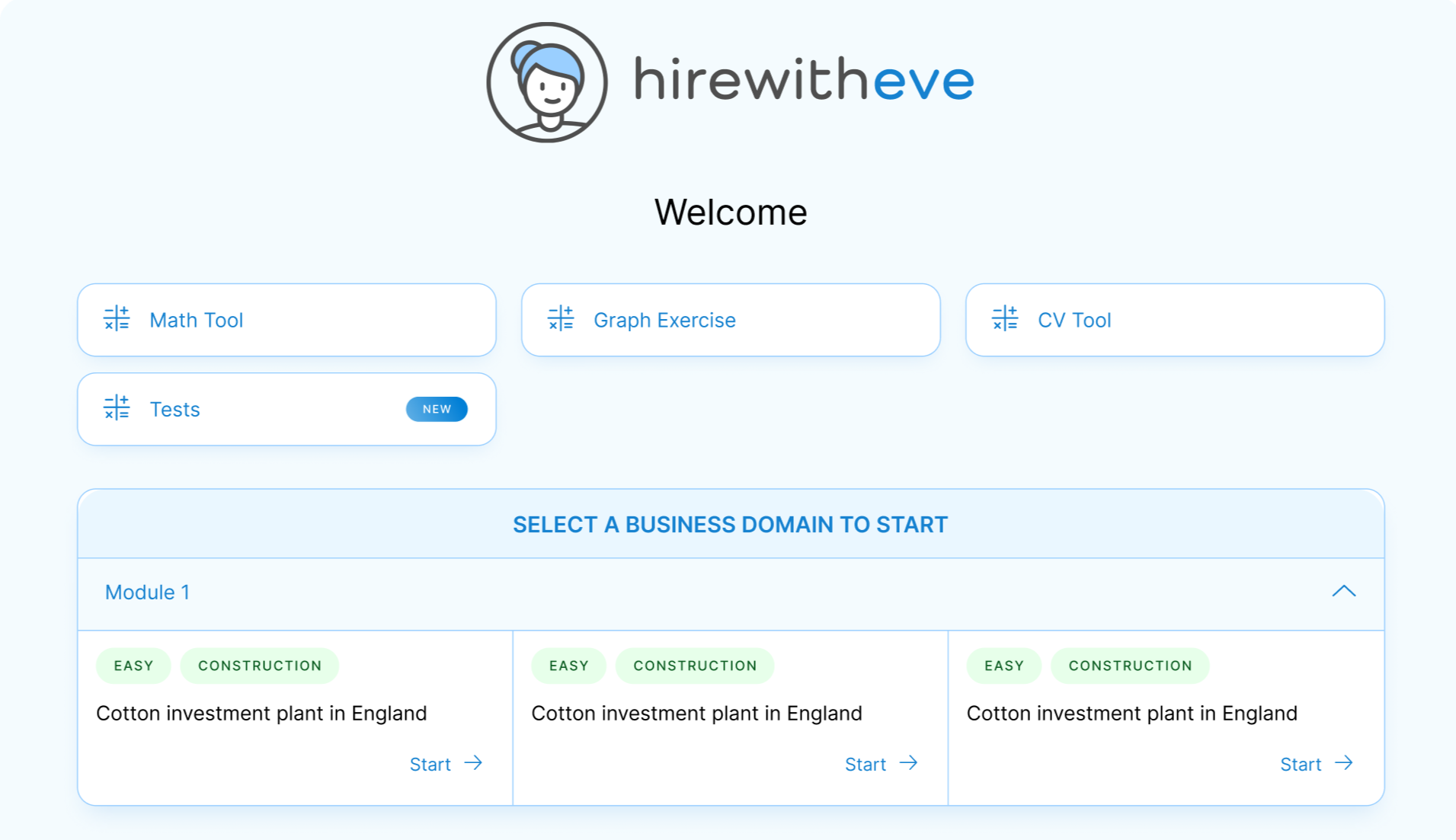Enhancing Cognitive Thinking Skills for HR Managers & Talent Acquisition

Traditional hiring methods often fall short when searching for candidates with unique skill sets crucial for your company's success. One of these essential skills is cognitive thinking, which HR recruiters frequently struggle to assess effectively. This blog explores how to overcome this hurdle using cognitive ability tests, helping you redefine talent acquisition and find the best talent for your organization.
We'll delve into nine different cognitive thinking definitions, discuss methods to test candidates or current employees for mental abilities and provide examples of cognitive thinking in the workplace. Additionally, we'll explain how HirewithEve can be your go-to software for all your talent assessment needs.
Table of contents
Understanding Cognitive Thinking
The Nine Types of Cognitive Thinking
How to Improve Cognitive Thinking
Assessing Cognitive Thinking Skills: A 6-Step Process
Why HirewithEve is the Right Fit for Your Talent Assessment Needs
FAQs on Cognitive Thinking and Talent Assessment
Understanding Cognitive Thinking
Cognitive thinking encompasses the mental processes people use to learn, reason, read, think, and focus. This concept from cognitive psychology includes skills like attention, memory, understanding, and critical thinking, which help individuals turn information into knowledge effectively in their everyday lives. Each cognitive skill plays a vital role in cognitive development and how the brain handles various scenarios. A weakness in any cognitive ability can significantly impact how well one can acquire, retain, and apply new information.
Cognitive Science and Neuroscience
Cognitive science looks at brain structure from a healthcare perspective, aiming to understand human cognition and brain health. Neuroscience also deals with metacognition, intentionality, and learning processes.
Importance in the Workplace
In the workplace, cognitive thinking skills such as focused attention, memory recall, retention, and analytical reasoning are crucial for interpreting data, remembering goals, and maintaining attention during meetings. These skills support integrating new information with existing knowledge, solving problems efficiently, planning, and innovating. Cognitive thinking also aids in prioritizing tasks, adapting to new challenges, and communicating effectively, fostering a productive and collaborative environment.
The Nine Types of Cognitive Thinking
Cognitive thought processes form the foundation of how we perceive, interpret, and interact with the world. They encompass various mental activities, from basic information processing to problem-solving and creative thinking. Experts categorize cognitive thinking into nine main types:
Sustained Attention
Sustained attention allows individuals to focus on one task for extended periods. However, this ability has certain limitations. Overdoing it can result in mental fatigue and anxiety, sabotaging the cognitive thinking process and decreasing productivity. Typical signs of mental fatigue include making simple errors, lack of attention, and irritability, all of which impair cognitive thinking.
Selective Attention
Selective attention is the ability to focus on a single task despite the presence of other tasks. This process, also known as “the cocktail party effect,” refers to the ability to concentrate on one conversation in a noisy environment. Individuals who can filter information and prioritize tasks effectively are generally more productive and successful.
Divided Attention
Divided attention, or multitasking, helps individuals retain information while completing multiple tasks simultaneously. While multitasking can be useful, chronic multitasking can reduce productivity by up to 40% and impair selective attention. Pairing tasks, prioritizing by urgency and complexity, allocating specific time blocks, and minimizing distractions can help manage divided attention effectively.
Long-Term Memory
Long-term memory, also known as “reference memory,” refers to recalling information from the past, whether hours or years ago. This type of memory has an unlimited capacity, allowing information to stay in the brain indefinitely. It helps individuals remember key points from past meetings, use advanced software functions, and apply previous training to current tasks.
Working Memory
Working memory, or short-term memory, helps individuals retain information temporarily while using it. For example, memorizing a new PIN and then forgetting it shortly after use. Working memory is limited, typically effective for five to nine pieces of information (Miller’s law). Understanding this principle is crucial for managing cognitive load and designing effective communication and training strategies.
Logic and Reasoning
Logic and reasoning are essential for solving problems and generating ideas. Cognitive thinkers gather information, analyze facts, and decide on the best solution based on their findings. Employees with strong logic and reasoning skills contribute to company success by improving efficiency, adaptability, and innovative decision-making.
Auditory Processing
Auditory processing refers to how the brain interprets sounds, supporting active listening and communication skills. Poor auditory processing can lead to misunderstandings and reduced trust in management. Evaluating a candidate's communication skills through tests can help identify strengths and weaknesses, promoting inclusive and effective communication in the workplace.
Visual Processing
Visual processing involves interpreting images and text. Strong visual processing abilities are crucial for roles such as graphic designers, data analysts, and UI/UX designers. Good visual processing helps individuals spot errors, analyze designs, and understand visual data representations. Tests assessing attention to detail can help identify candidates with strong visual processing skills.
Mental Processing Speed
Mental processing speed refers to how quickly and accurately individuals can perform tasks. High processing speed allows for rapid data interpretation, while slower processing speeds do not necessarily indicate lower cognitive intelligence. Providing support and appropriate task allocation can help individuals with varying processing speeds perform effectively in the workplace.
How to Improve Cognitive Thinking
Improving cognitive thinking can enhance workplace productivity and employee well-being. Here are five practical tips to support cognitive development:
Prioritize Physical Exercise
Regular physical activity boosts blood flow to the brain, supporting mental health, stimulating new neural connections, and releasing growth factors beneficial for cognitive functions. Incorporating physical activity into daily routines can improve memory, concentration, and overall cognitive thinking.
Reduce Stress
Chronic stress can impair cognitive functions such as memory, attention, and decision-making. Reducing stress through mindfulness, meditation, deep breathing exercises, and regular breaks can enhance cognitive performance. Creating a supportive and relaxing work environment also contributes to stress reduction.
Engage in Continuous Learning
Continuous learning keeps the brain engaged, supporting cognitive thinking and adaptability. Setting clear learning goals, participating in online courses, reading industry materials, and engaging in professional communities can stimulate neuroplasticity and cognitive functions.
Incorporate Brain-Training Exercises
Brain-training exercises challenge the mind and improve mental agility. Regularly engaging in puzzles, memory exercises, and strategy-based games can enhance cognitive performance. Learning new skills such as a language or instrument also contributes to cognitive development.
Connect with Others
Social interactions stimulate brain function and slow cognitive decline. Engaging in meaningful conversations, collaborative problem-solving, and networking can create a dynamic and cognitively stimulating work environment. Building strong professional relationships and participating in mentorship programs can further enhance cognitive thinking.
Assessing Cognitive Thinking Skills: A 6-Step Process
Assessing cognitive thinking skills is crucial for identifying candidates who can contribute to your organization’s success. Here is a six-step process to effectively evaluate these skills:
Choose the Right Tests
Select cognitive ability tests relevant to the specific role you are recruiting for. For example, use the Critical Thinking test to evaluate a candidate’s deduction, argument analysis, assumption recognition, and logical connection skills.
Create a Baseline
Establish a benchmark by asking current high-performing employees to take the tests. Use their scores as a baseline for comparison with candidate results.
Test Your Candidates
Cognitive ability tests speed up the screening process and are more accurate than traditional methods. Combine cognitive tests with role-specific and personality assessments for a comprehensive evaluation.
Evaluate the Results
Compare the candidate’s scores against the established baseline. Eliminate candidates who score significantly below the benchmark and shortlist those who meet or exceed it.
Interview the Top-Scoring Candidates
Conduct structured interviews with predefined cognitive ability questions to assess candidates further. Focus on areas of strength and weakness identified in the tests.
Make a Decision
Use the test results in combination with interviews and reference checks to make informed hiring decisions. Avoid relying solely on test scores to ensure a holistic evaluation of a candidate’s skills.
Why HirewithEve is the Right Fit for Your Talent Assessment Needs
HirewithEve offers a comprehensive suite of cognitive ability tests designed to meet your talent assessment needs. Here’s why HirewithEve is the ideal choice:
Comprehensive Test Library
HirewithEve provides a wide range of cognitive ability tests, allowing you to choose the most relevant ones for your specific hiring needs. Whether you need to assess problem-solving, critical thinking, communication, or attention to detail, HirewithEve has the right test for you.
Customizable Assessments
You can combine up to five different tests to create a tailored assessment that covers all the necessary cognitive skills for the role. This customization ensures a comprehensive evaluation of each candidate.
Benchmarking and Baseline Creation
HirewithEve allows you to create benchmarks by testing your current high-performing employees. This feature helps you compare candidate results accurately and make informed hiring decisions.
User-Friendly Interface
The user-friendly interface of HirewithEve simplifies the testing process for both recruiters and candidates. The platform is designed to provide a seamless experience, ensuring accurate and reliable results.
Support for Inclusive Hiring
HirewithEve’s assessments are designed to be fair and unbiased, promoting inclusive hiring practices. The platform offers tests that accommodate various needs, ensuring every candidate has an equal opportunity to demonstrate their skills.
Real-Time Results and Insights
HirewithEve provides real-time results and insights, allowing you to quickly identify top candidates and make timely hiring decisions. The detailed reports help you understand each candidate’s strengths and weaknesses, supporting a thorough evaluation process.
Proven Success
Many companies have successfully used HirewithEve to improve their hiring processes. The platform’s effectiveness in identifying candidates with the right cognitive skills has helped organizations avoid costly mis-hires and build strong, competent teams.
FAQs on Cognitive Thinking and Talent Assessment
Is cognitive thinking a skill?
Yes, cognitive thinking encompasses various mental processes such as problem-solving, decision-making, memory, and learning. It involves processing information, reasoning, reflecting, and applying logic, crucial for overcoming complex challenges and making informed decisions.
What is the difference between cognitive thinking and critical thinking?
Cognitive thinking involves general mental processes for gaining knowledge and comprehension, including memory, judgment, and problem-solving. Critical thinking is a specific aspect of cognitive thinking focused on analyzing facts to form a judgment, involving active evaluation, analysis, and synthesis of information for better decision-making.
What are the four types of cognitive processing?
Perception: Organizing and interpreting sensory information.
Attention: Focusing on specific stimuli while ignoring distractions.
Information Processing: Transforming sensory input into meaningful information.
Memory: Encoding, storing, and recalling information.
How can I improve my cognitive thinking?
Engage in brain-stimulating activities, stay physically active, practice stress-reducing techniques, socialize, and continuously learn new skills. Prioritizing sleep and adopting a healthy diet also support cognitive health.
Target Your Talent
Unlock tailored solutions for your recruitment and hiring needs with Eve Platform's extensive case study library.
Stay informed with daily updates on news, trends, and expert analysis tailored for HR professionals.
Subscribe now to enhance your HR expertise and excel in your role.
Free Resources

Transforming Hiring: 7 Key Recruiting Metrics
Enhancing recruitment processes with data-driven insights for better hiring outcomes.

Reducing Hiring Bias with Hirewitheve.
Utilizing Hirewitheve to combat bias and streamline recruitment processes effectively.

Hiring Detail-Oriented Candidates
HirewithEve enhances hiring by accurately assessing candidate's attention to detail-oriented.








